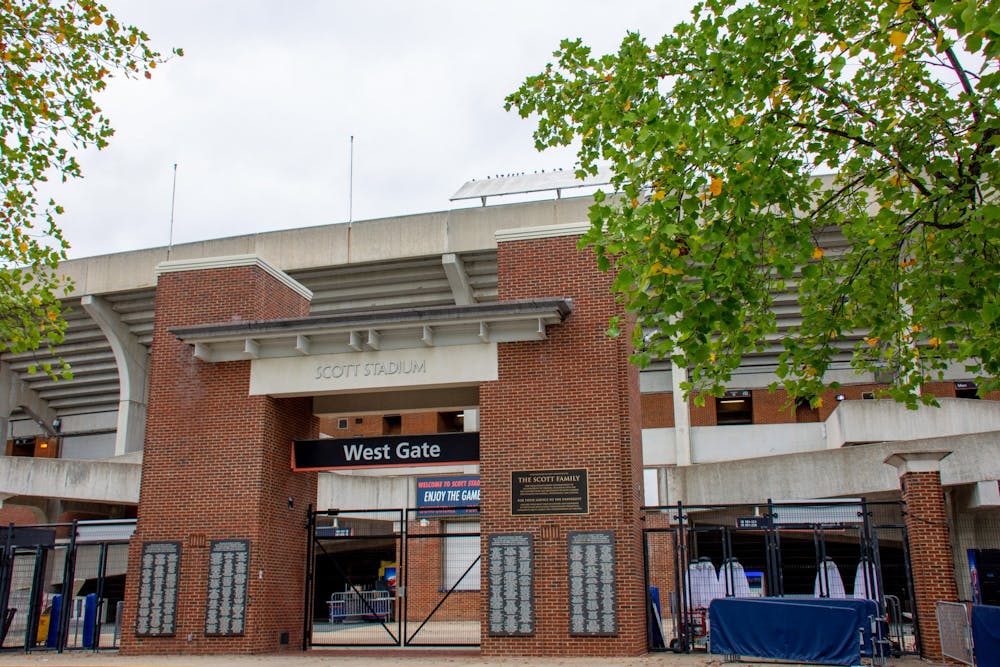Virginia football has partnered with the University’s Office for Sustainability to co-host Saturday’s game against Duke for the 11th time. At this annual Green Game, the Office for Sustainability seeks to minimize the amount of waste generated at the University, educate fans on the University’s sustainability efforts and provide students with a hands-on opportunity to contribute to the University’s sustainability goals.
Annually, the University generates about 15,000 tons of municipal solid waste. Since 2014, the amount of total waste generated has decreased by approximately 4.7 percent.
The Office for Sustainability works alongside Virginia Athletics as part of its Single Use Plastic Reduction strategy to increase sustainability efforts at all athletic events. This plan, implemented in response to an executive order signed in March, helps University members navigate the transition to single-use plastics. As of July 21, the University no longer purchases single-use plastic bags, cutlery, food containers and straws, with an ultimate goal of eliminating all single-use plastics by 2025.
The sustainability team is exploring options around waste diversion practices, strategic communication and fan engagement. At the Green Game, the Office for Sustainability hopes to divert as much waste as possible, working toward a “Zero Waste Game'' where 90 percent of waste is diverted from the landfill to be recycled or composted.
In 2019, the waste diversion rate for the Green Game was 59 percent. In 2018, the University achieved a waste diversion rate of 63.4 percent, placing third in the ACC and tenth in the nation. Due to the COVID-19 pandemic, there was no Green Game last year, but this year, the Office for Sustainability hopes to get that number to over 70 percent.
“This is a really tough goal and we’ll need everyone at all levels of the University thinking about how to reduce the amount of waste generated in all the daily decisions they make,” sustainability director Andrea Trimble said.
The University’s material and waste goal is to reduce the University’s waste footprint to 30 percent relative to 2010 by 2030. An increase in composting programs around Grounds in recent years led to the University composting 805 tons in 2018. U.Va. Dining is also offering back-of-house composting at over 20 locations around Grounds including West Range Cafe, Hereford College and the International Residence College.
At the game, there will be dozens of compost bins lining the concourse as well as numerous volunteers helping with bin sorting and fan engagement.
“Whenever you have thousands of people consolidated in one space, you will likely see an uptick in waste,” sustainability coordinator Lela Garner said. “We have been working closely with Virginia Athletics and U.Va. Dining to make sure fans are aware of waste minimization best practices.”
Currently, over 70 student volunteers are spread across three shifts. Signups are now closed.
Fourth-year College student Sadey Rodriguez has been volunteering for the Green Game since she was a first year in 2018. As a track and field athlete, she noted it’s important for her to support the University’s initiatives to minimize waste generated at athletic events.
“[Volunteering] gave me new and surprising insights to how much waste high volume athletic events generate,” Rodriguez said. “I've enjoyed helping fans learn how to properly sort waste and helping the recycling team to track waste diversion numbers.”
As a volunteer, Rodriguez also helps spread the word about why diverting waste from landfills is so important.
The first shift of volunteers will hand out recycling bags and infographics to tailgaters. These infographics give insight on the Green Game with the goal of getting attendees excited about competing against the Blue Devils while diverting waste.
The second shift will help roam the concourse during the game, sorting through bins and ensuring that waste is properly divided between compost bins and recycling bins to avoid contamination of the compost.
Finally, the third group of volunteers will sweep the stadium with recycling and compost bags in order to pick up as many items as possible, ensuring that everything is correctly sorted.
“The Green Game is one of many important initiatives the University has planned that shows U.Va. truly cares about moving towards a more sustainable future in sports,” Rodriguez said.
Beyond the Green Game, the sustainability team also hopes to provide more compost and recycling bins at a variety of athletic venues.







